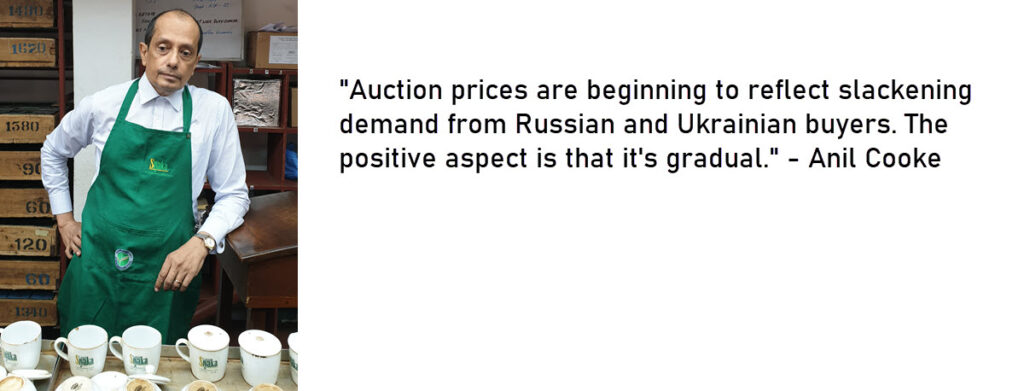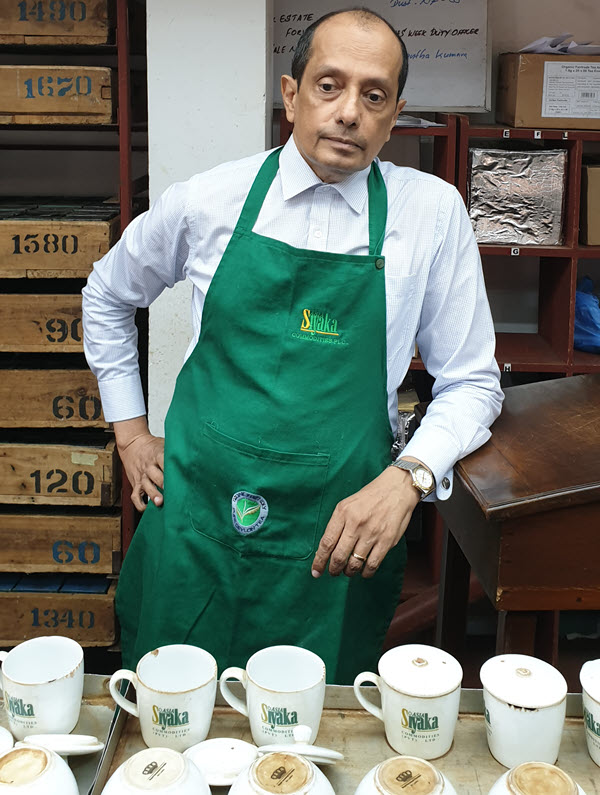Tea Biz travels to the UK offices of the International Tea Committee where Chairman Ian Gibbs describes the immediate and potentially long-term impacts on the global tea trade stemming from the ongoing crisis in Ukraine. According to Gibbs, the combination of sanctions and the collective refusal of the world’s largest container shipping companies to deliver or receive goods will interrupt tea shipments to Russia, but no one knows for how long.
- Caption: Ian Gibbs, Chairman since 2016 of the International Tea Committee
Hear the interview
Payment Concerns Further Disrupt Global Tea Supply Chain
On top of the upheaval in the tea trade caused by the pandemic, new worries include guaranteeing payment for containers of tea without violating sanctions while booking scarce carriers for shipments to the Russian Federation and Ukraine. Stocks of tea in Russia are adequate for several months, but the interruption of scheduled replenishment that averages 120 containers a week will invariably lead to shortages.
As the ruble’s value collapses, Russian tea buyers accustomed to favorable credit terms now find it difficult to secure the financing needed to pay upfront, according to Ian Gibbs, chairman since 2016 of the International Tea Committee (ITC). In 2020 Russia imported 142,000 metric tons of tea, valued at $412 million — a total likely to decline in 2022. Gibbs predicts a dip – but not a big drop in the volume of tea shipped to the world’s third most valuable tea market.
Dan Bolton: Ian, will you put into perspective the impact of the invasion of Ukraine? How will a prolonged crisis impact the global tea trade?
Ian Gibbs: Initially, it will be a very worrying time for many producers. It’s going to affect some more than others. Reduced demand in one market will have knock-on effects elsewhere.
If we look at the main countries from which Russia sources its tea (See chart below, all ITC figures are from 2020), India is likely to be hit the hardest — just over 39,000 metric tons or 19% of their exports went to Russia in 2020. Sri Lanka sent 30,000 metric tons to Russia, representing 11% of their total exports.
On the other hand, Kenya exported 25,000 metric tons to Russia — a significant figure for Russia but a total that represents less than 5% of Kenya’s annual exports.
Vietnam exported 13,000 metric tons to Russia (10% of their total exports). Indonesia exported 8,500 metric tons, a smaller quantity than the other countries I’ve mentioned, but a quantity that represents nearly 19% of Indonesia’s tea exports. So that suggests that Indonesia could be hit quite hard.
Tea is regarded as an essential product and along with other foodstuffs should, I understand, be exempt from the sanctions. But producers will still have considerable issues to contend with, such as finance, which currency to use, the ruble’s depreciation, insurance, and shipping. Regardless of what’s being shipped, many shipping lines have stopped shipping to Russia.
Unlike other occasions when sanctions have been applied, I think that the feeling of the majority of people worldwide — at the government level, commercial companies, and as individuals — is they want to see these sanctions effective as a result of what they are seeing on the television and the internet. So, it’s going to be quite a challenging task, I think, for exporters.
Dan Bolton: Will black tea producers concerned over price and settlement of payments* cut production, or will tea previously destined for Russia find its way to other markets?
Ian: I don’t think producers will cut production. Tea is exempt from sanctions; probably quite a large quantity will be imported by Russia.
However, there will be a hiccough in the short term as the players in the market work out how to deal with the various issues I listed earlier. There is no doubt these issues are substantial, so the market is likely to be adversely affected for a while.
New markets don’t suddenly appear, but I hope that producers (and by this, I mean producing companies backed by their countries’ governments) will use this opportunity to explore new markets, which could be a long-term benefit to everyone.
“I think that the trade-in foodstuffs, including tea, should be restored to normal fairly quickly once hostilities end. I don’t believe that in the long term, there will be a major disruption to trade.”
“I think that the trade in foodstuffs including tea, should be restored to normal fairly quickly once hostilities end. I don’t believe that in the long term, there will be a major disruption to trade.”
Ian Gibbs
Dan Bolton: Will this crisis soon pass? Or do you foresee years of sanctions that permanently disrupt the current alignment of the tea supply chain?
Ian: Everyone wants the whole problem solved very, very quickly. The amount of damage already done in Ukraine means that the effects of this invasion will be felt for a long time.
It will take time to rebuild Ukraine and for trust to be restored between Ukraine and Russia and all the other parties involved.
It will be a while before we get back to normal. However, I think that the trade in foodstuffs, including tea, should be restored to normal fairly quickly once hostilities end. I don’t believe that there will be a major disruption to trade in the long term.
Tea is not alone; other commodities are contending with the same problems. It’s worth noting all this is happening against a hike in the price of coffee over the last year, which has happened for several reasons, and so there is potential for tea to benefit as people can be expected to switch from coffee to tea.
In my view, demand will be there, and I believe the government of Russia will be keen to make sure that people get their tea. It is going to take time to settle down. As far as the tea industry is concerned, I personally believe that it’s a blip — it’s going to take time to sort things out, but new opportunities are invariably out there waiting to be explored — and we have to find them
Tea Exported to Russia (2020)
| Total Production (mt) | Total Exports | Exports to Russia | %age1 | |
| China | 2,986,016 | 348,815 | 15,300 | 4.39 |
| Georgia | 5,000 | 1,800 | 200 | 11.11 |
| India | 1,257,530 | 203,565 | 39,200 | 19.26 |
| Indonesia | 126,000 | 45,265 | 8,500 | 18.78 |
| Iran | 19,000 | 7,000 | 600 | 8.57 |
| Kenya | 569,536 | 518,921 | 25,100 | 4.84 |
| Sri Lanka | 278,493 | 262,726 | 30,400 | 11.57 |
| Vietnam | 186,000 | 130,000 | 13,000 | 10.00 |
1 Percentage of tea producing country’s total exports to Russian Federation
Ian Gibbs was elected Chairman of the International Tea Committee in May 2016. On leaving school, Ian served 14 years with the British Army. He joined the tea trade in London in 1990, working with tea brokers Wilson Smithett in the City of London until 2005 when he set up his own company. Ian joined the management board of the ITC in 2009, representing Malawi, and became Vice-Chairman in 2010. Ian graduated in 2017 with a BA (Hons) at the Open University in the UK, majoring in French and International Relations.
*SWIFT is a secure protocol used by 11,000 financial institutions to transfer about 70% of interbank funds. Founded in 1973, SWIFT is managed by the Society for Worldwide Interbank Financial Telecommunication. The EU, UK, Canada, UK, and the US barred seven Russian banks as of March 1 and are expected to add more to the list, according to Reuters. SWIFT announced the disconnect is effective March 12. It is only the second time that the world’s central banks agreed to sanction a country’s banking system, writes Forbes.

Established in 1933, the International Tea Committee (ITC) has provided the tea industry with valuable statistical information for more than 80 years. The ITC is an unbiased, non-profit supported and recognized by many major tea-producing and tea-consuming nations as the official source of timely, accurate, impartial data suited to all statistical requirements. To learn more, visit intea.com
Link to share this post with your colleagues
Signup and receive Tea Biz weekly in your inbox.





